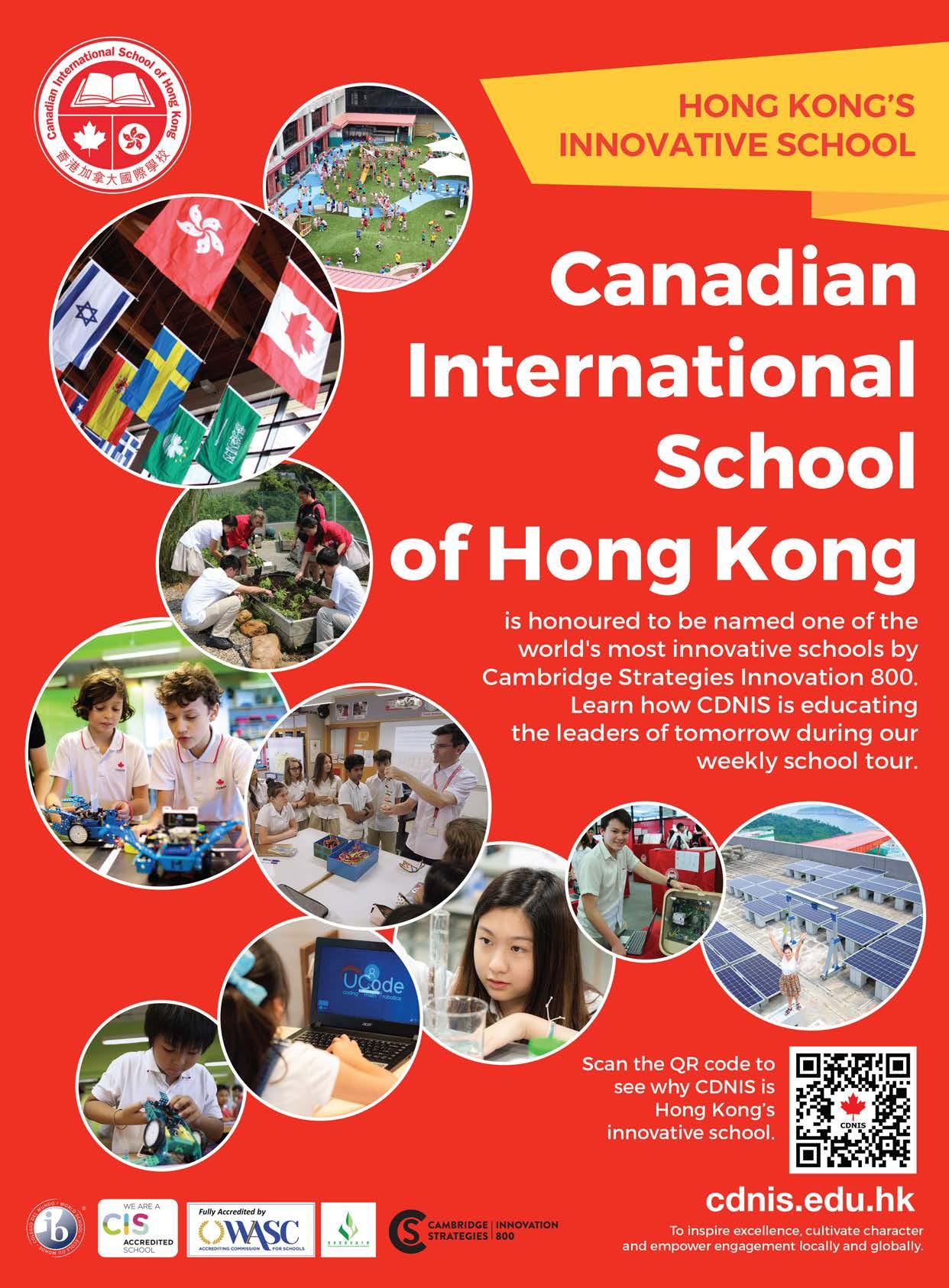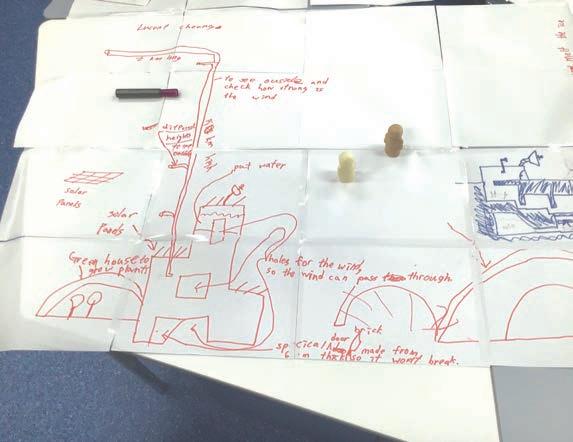
6 minute read
FEATURE: EDUCATION TRENDS
Kellett School, The British International School in Hong Kong
Full Steam Ahead
Advertisement
In recent years, STEM has become a buzzword in education circles, leading to many schools incorporating it into their curriculums. Here, we look at how Hong Kong’s schools are adapting this approach in 2020. – By Sarah Graham
Over the last two decades, the way educators approach the disciplines of science, technology, engineering and mathematics has been constantly evolving.
Although STEM education may feel like a recent trend, the concept of combining these subjects to improve competitiveness in these areas has in fact been around since the 1990s. The United States was the first to embrace it to meet a shortfall of candidates for tech jobs. Others quickly followed.
Now, it seems, it’s everywhere. And in many schools, it has evolved into STEAM, to include the arts.
So how is it working in Hong Kong’s schools? When it comes to this particular trend, Hong Kong was a little late to the game, with the Education Bureau only proposing strategies and recommendations on promoting STEAM education as late as 2015. At the time, the Education Bureau’s report highlighted the need to “nurture a versatile pool of talents with different sets and levels of skills to enhance the competitiveness of Hong Kong” through STEAM education.
Since then, it’s safe to say some of Hong Kong’s schools have taken the concept a step further.
Take the newly opened Wycombe Abbey School, for example. It not only promotes STEAM education but has added an ‘i’ to the acronym.
Shahzada Janjua, head of iSTEAM at the school, explains that the addition of the ‘i’ represents computing.
“We’re integrating computing with STEAM – they’re inseparable really because when we’re talking about building something, we use computer-aided software. We’ve taken what’s out there for STEM and STEAM and shaped it and given it some purpose,” he says.


Wycombe Abbey School
The school incorporates different themes into its STEAM learning for each school year, focusing on the geography of the region for greater pupil engagement. For example, projects underway are looking at China and its moon rover mission, and Hong Kong and its architecture.
“We’re building lifelong skills. For Year 1, we’re helping their motor skills become finer. We’re also enabling computational thinking – I taught them algorithms using musical sequences on a colour scratch piano,” Janjua says. “We have a Mission to Mars project that runs throughout the school. It gives us a great way to tackle the theme of space together, for example, how would you build homes on Mars?”
He says that more than anything STEAM is about critical thinking and problem solving, skills that will be crucial in a future world where automation will play a major role.

Canadian International School of Hong Kong
“These skills are key for the next 20-50 years. Employers are looking for these types of skills. We’re developing critical thinking at a younger age. By the time we get to Year 6 you can imagine what sort of problem solvers there will be,” Janjua adds.
The Canadian International School of Hong Kong has incorporated STEAM into its curriculum since the school was established in 1991. Its wellestablished culture of innovation led it to take STEAM a step further in 2017, when it formally rolled out a school-wide plan called Project Innovate.
An initiative for pupils from Pre Reception to Grade 12, it focuses on providing students with the skills and mindset they need to be successful in our fast-changing world. Project Innovate incorporates two additional elements: 21st century competencies of creativity, collaboration, communication and critical thinking; and character-building including resilience, curiosity, adaptability and leadership.
Head of School, Dr. Jane Camblin, explains that Project Innovate is not simply an add-on or general lesson given once a week. She says collaboration is encouraged both inside and outside the classroom, with technologies such as 3D printers, laser cutters, virtual reality, robotics, and augmented reality readily available for all to use.
“STEAM education encourages the critical thinkers and team players, enhances imagination, increases science literacy, and enables the next generation of innovators. Students who embrace STEAM subjects develop the core skills needed by future leaders to meet the demands and succeed in today’s fast-changing world,” she says. “As an IB school in which teachers and students alike learn to become balanced, reflective, openminded risk-takers, STEAM is another versatile tool in service of education in both real and virtual time – a tool even more valuable currently in Hong Kong as more and more reliance on online learning is necessitated by current events.”
Another school that is coming at STEAM from a different angle is Kellett School, the British International School in Hong Kong. Its Principal & CEO, Mark Steed, argues that the original concept of STEM education has become somewhat outdated, and in many ways misconstrued.
Canadian International School of Hong Kong



“STEM was set up in America in order to promote science and technology because it was so weak. Hong Kong has a totally different context to that. If anything, education here needs to be more balanced than that,” he says, adding: “The whole thing has got out of hand and has become a bandwagon that people have jumped on. It was trying to address a deficit in America. By any account Hong Kong has some of the best maths and science learning in the world.”

Kellett, a not-for-profit, parent-governed school that follows the English National Curriculum, offers a “futureproof” style of education with innovation at its core. Steed points to the upcoming Sixth Form mini Master of Business Administration (MBA) program as an example of how the school is preparing its students for the future workforce – a workforce he is well aware will offer jobs not yet dreamed of. “We hold problemsolving days rather than doing a formal STEAM program. Our aim is to find time in the curriculum to teach innovation and 21st Century skills. One of the things we’re setting out to do in this school is to prepare young people for the world in the mid-21st Century. We’re trying to balance that and prepare them for this very different world,” he says. Steed is relatively new to Kellett, joining the school last year from Jumeirah English Speaking School in Dubai. One of his successes there was the launch of a cross-curricular subject called Innovation, which brought together various departments including IT, maths and computing, and encouraged designthinking, problem solving, collaboration skills, and communication. Wycombe Abbey School Mark Steed, Principal and CEO, Kellett British International School

Dr Jane Camblin with Grade 5 students at Canadian International School of Hong Kong

“The students designed flatpack furniture then went into a Dragon’s Den to pitch it. Eventually the winners had the furniture made and it was placed around the school,” he says.
He plans to continue this innovational learning at Kellett. “We’re trying to prepare students not only in terms of skills for the workplace but also in having the mental capacity and resilience needed to navigate change. We’ve got to give people the skills to upskill through life. The world is changing, and the challenges are different.”











